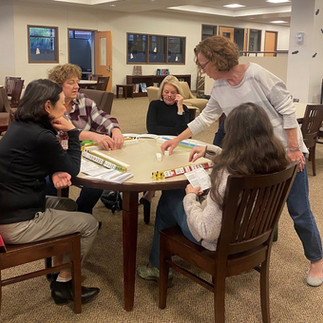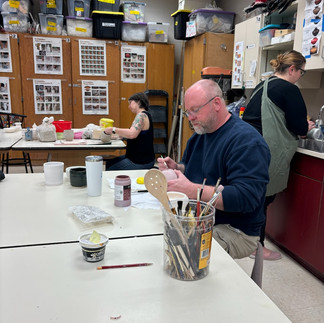Lifelong Learning Opportunities Abound
- Hilary Daninhirsch
- Oct 12, 2024
- 4 min read

While formal education ends after high school, college, or graduate school, many adults enjoy pursuing informal educational opportunities throughout their lives. From academic pursuits to learning a new skill or just dabbling in a discipline that piqued your curiosity, opportunities to engage in ‘adult school’ are endless.
Public libraries, which have always been community centers, are an excellent source for where to find classes in a number of subjects. Shaler North Hills Library, for example, offers a large number of class selections in various areas, from health-related (gentle exercise, meditation) to informative (nature series, local history, travel) to creative outlets like a Reader’s Theater Group or a knitting and crocheting group called Needles & Hooks by the Books. Seasonally, the library offers classes called Nature Snippets: adult interactive classes led by master naturalists; a Hot Topics Legal Series led by local attorneys; and a Botanic Drawing Class run by a trained botanic drawing artist.
Unless there is a supply or speaker fee, the majority of these classes are free.
“Besides programs and classes, we routinely do a lot of technology assistance on a one-to-one basis. Libraries help people with their email, navigate the internet, use online resources, print, and more,” said Beth A. Lawry, manager of adult services at the Shaler North Hills Library.
Launched in 2022, La Roche University’s Introcaso Center for Lifelong Learning, established by the late Sister Candace Introcaso, offers over 90 classes for adult learners, many of which take place on campus, while others are held at various locations off-campus. Executive Director Jennifer Engel said that there are a wide range of classes available, including art, yoga, history, and political science. Classes are taught by both La Roche faculty and community members, depending on their expertise.
“We also have off-campus events; the Holy Trinity Greek Orthodox church will host a cooking class and a class on the place of iconography,” said Engel.
“Each term we try to offer about 70% new content, but we do repeat classes that are popular,” added Engel. The program is an annual membership that runs for three terms, beginning in the fall. One of the most popular classes is a ‘theater in the city’ class, taught by an emeritus professor. Attendees have the opportunity to see plays in the Cultural District and hear guest speakers.
Adventures in Learning (ALL) is geared toward people 50 and better. “Both programs have really taken off. ALL started with 55 members, and we finished last summer at 478,” said Engel.
Sweetwater Center for the Arts, an education and arts center in Sewickley, offers opportunities for novice to advanced learners to explore their creative sides with classes, such as 2D art, ceramics, metalsmithing, and cooking, among other topics. “We also have exciting opportunities throughout the year that are specialty/master classes which allow you to focus on more specific or advanced skills, like husk broom making, for example,” said Saige Baxter, director of community engagement and education at Sweetwater.
Baxter said that some of the students who take classes have reported an improvement in mental health or gratitude for building confidence in a certain skill or craft. No membership is required to take classes, but members do get a 10% discount.
Primarily held at the Fox Chapel Area High School and in the gyms of the four district elementary schools, Fox Chapel Area Adult Education (FCAAE) offers a rotating menu of adult enrichment classes between September and May, from one-night classes to multiweek series. A variety of topics are covered, from art to photography to technology to home and garden to foreign language, and more. “FCAAE was created in 1962 as a collaborative effort between community members and the Fox Chapel Area School District (FCASD) to allow adults, not just students, to utilize the school facilities and resources to learn new skills and find personal fulfillment,” said Susan Goodwin, who has served as executive director of the program for more than two decades.
The demographic of attendees ranges from 18 to 80+. Goodwin said that some of the most popular classes include swim, pickleball lessons, cooking classes by Chef Jon of The Hartwood Restaurant, and hands-on clay and wheel throwing. Instructors are adults who want to share their expertise with other adults. “We always look for opportunities to partner with small businesses in what I like to call a ‘win-win’: our students learn from someone knowledgeable in that field, and the local business is introduced to our group of supportive students,” she said.
Benefits to lifelong learning are numerous, from friendships formed outside of the classroom setting to keeping your mind sharp. “Opportunities to learn provide a whole host of benefits—ability to stay informed about our community and our world; keeping our brains active and engaged; even providing social interaction. All of these benefits are tied to supporting good mental and physical health,” said Lawry.
“To me, lifelong learning involves both formal and informal learning – it is a ‘habit’ that is nurtured throughout life to foster continuous growth, healthy living, and personal fulfillment. It can come in the form of classes, reading materials, lectures, and many other educational avenues. A curious mind that continues to ‘feed itself’ is a healthy mind. I look at it as a way to keep the brain muscle exercised, stay informed, and even to be a more interesting person. It has a place in all stages of life but especially after formal education has ended,” said Goodwin.
Engel added that you’re not evolving and changing if you do not pursue learning opportunities. “If you don’t continue to grow, you will be left behind. The amount of information coming at us has exploded even from ten years ago, and if you keep craving that knowledge, you will be more curious, and great things happen when curiosity is used for good.”










































Trusted Kids Dentist in San Antonio, TX
Finding the right kids dentist in San Antonio, TX, is essential for your child’s dental health and comfort. At our pediatric dental practice, we specialize in providing high-quality dental care for children in a fun, friendly, and stress-free environment. Our goal is to ensure that your child has a positive dental experience, setting the foundation for a lifetime of healthy smiles.
Why Choose Our Kids Dental Services?
Our team of experienced pediatric dentists is trained to handle the unique needs of young patients. We offer a range of services designed for children's dental health, including:
Routine Checkups – Regular exams to monitor tooth development and identify potential issues early.
Teeth Cleaning – Professional cleaning to…
Denture Implants in Portland, TX
For those seeking a secure and long-lasting solution for missing teeth, denture implants in Portland, TX provide exceptional stability and comfort. Unlike traditional dentures, implant-supported dentures are anchored to the jawbone, preventing slipping and offering a more natural feel.
Why Choose Denture Implants?
Denture implants use titanium posts surgically placed in the jawbone to support custom-made dentures. This integration helps preserve bone structure and enhances chewing ability.
Key Benefits:
Superior Stability – No slipping or discomfort.
Prevents Bone Loss – Implants stimulate jawbone health.
Natural Appearance – Custom-designed for a perfect fit.
Long-Term Durability – A lasting solution with proper care.
If you’re considering denture implants in Portland, TX, consult a local dentist for a personalized treatment plan and restore your…
At Wise Dental, we offer advanced cosmetic dentistry services designed to enhance your smile and boost your confidence. Our skilled team uses state-of-the-art techniques to address various dental concerns, including teeth whitening, veneers, bonding, and full smile makeovers. Whether you need minor improvements or a complete transformation, we tailor each treatment plan to meet your unique needs. With a focus on both aesthetics and function, our goal is to create a natural, radiant smile that you’ll be proud to show off. Trust Wise Dental for exceptional cosmetic dental care.
Cosmetic dentistry in Bridgeport, TX
Dentures in Fitchburg, MA
If you're missing teeth, dentures in Fitchburg, MA offer a reliable solution to restore your smile and improve oral function. Whether you need full dentures for complete tooth loss or partial dentures for a few missing teeth, local dental experts provide custom-fit options for maximum comfort and durability.
Modern dentures enhance chewing, speech, and confidence, allowing you to enjoy daily activities without discomfort. Advanced materials make them look natural and feel comfortable. Dentists in Fitchburg offer personalized consultations to ensure the best fit and function for your needs.
Schedule an appointment today for a confident, healthy smile with high-quality dentures!
Composite Fillings in Rockport, TX
If you have cavities or minor tooth damage, composite fillings in Rockport, TX, offer a natural-looking and durable solution. These tooth-colored fillings blend seamlessly with your teeth, restoring both function and aesthetics. Unlike metal fillings, composite resin bonds directly to the tooth, requiring minimal removal of healthy enamel.
At your local Rockport dental office, composite fillings are used for both cosmetic and restorative purposes. They help repair decayed, chipped, or worn teeth while maintaining a natural appearance. The procedure is quick, typically completed in one visit, with long-lasting results when maintained with proper oral hygiene.
Looking for quality composite fillings in Rockport, TX? Contact a trusted local dentist today!
4o